When thinking about having your own startup, you should consider many factors such as market research, business plan, funding, risk management, branding, the choice of business credit cards for startups, and more.
All of these points need lots of time and effort to work on. For example, by market research, we mean understanding the market, identifying the niche, defining a target audience, and conducting competitor analysis. The Internet is full of tools that will help you save time and other resources as well as get things done quicker. One such tool is the Prelaunch AI Market Research Assistant, which facilitates market research by providing valuable insights, helping users identify niche markets, and assisting in the creation of a comprehensive business plan.
Seems like everything is ready to go, except for… Right! The choice of a credit card. And if you think that you just pick one credit card and use it no matter what your needs are, you’re wrong. Here you can find out not only the importance of the best business credit cards for startups but also what kind of startup business credit cards exist and which would be the best option for you.
The Importance of Business Credit Cards for Startups
Business credit cards for startups play a crucial role in financial stability and growth. They provide a distinct separation between personal and business expenses, facilitating efficient bookkeeping and financial management.
Beyond this organizational benefit, these credit cards serve as a valuable tool for building the business’s credit history. By using the card responsibly, startups can establish a positive credit record, enhancing their credibility and future access to financing.
Additionally, these cards usually come with different rewards programs and perks, providing cost-saving opportunities through cash back, travel rewards and perks, and discounts on business-related expenses. For startups with employees, business credit cards enable controlled spending with preset limits, contributing to effective expense management.
Factors to Consider When Choosing a Business Credit Card for a Startup
There are lots of factors founders need to take into account before picking a business credit card for startups. Some businessmen mention credit limits, rewards and perks, annual fees, interest rates, and payment terms. Making the right decision may be hard but it’ll help you establish your business credit and lower costs.
Moreover, it’s meant to keep your personal and business expenses separate, to have a better understanding of what’s going on in your personal and professional life. Here are some of the factors you need to consider before making your final decision.
Credit Limit and Credit Score Requirements
Startup ideas are very different, hence, the amount of money that’s needed for your business growth may vary. You should evaluate the initial credit limit and analyze whether it’s enough for your expected expenses and potential growth. Also, make sure that the credit card accommodates both regular expenses and any unforeseen costs.
It’s also important to acknowledge the credit score requirements of the startup credit card. Best business credit cards for startups are friendly to businesses with lower credit scores even if the businessman has a limited credit history.
Rewards and Benefits
Bear in mind that startup credit cards sometimes may have reward programs including cash back, miles, or points. The higher, the better. Another good point is a bonus offer such as sign-up or anniversary bonuses.
Annual Fees
Considering annual fees is crucial when choosing a startup business credit card. Evaluate the cost of the annual fee and weigh it against the card’s benefits and features. Ensure that the fee is justified by the rewards, perks, and overall value the card provides to your business.
Additionally, assess whether any introductory offers or waivers exist, and factor in the potential long-term impact on your startup’s budget and finances.
Introductory APR
Examining the “introductory APR” is important in selecting business credit cards for new businesses. Understand the duration and terms of any introductory Annual Percentage Rate (APR) offer, such as 0% APR for purchases or balance transfers. This can provide a temporary period of lower or no interest, aiding in managing initial expenses.
Consider how well the introductory APR aligns with your startup’s financial needs and repayment capabilities.
Mobile App Accessibility
When talking about the best business credit cards for startups, mobile app accessibility plays a vital role in on-the-go financial management. With real-time transaction monitoring, you can quickly identify and address any unauthorized activities.
Timely payment reminders and alerts help avoid late fees, while expense categorization provides insights into spending patterns. Secure access, instant card locking/unlocking, and paperless statements contribute to a streamlined and secure experience.
Direct support and features like expense receipt capture further enhance convenience, making a robust mobile app a valuable asset for managing your startup’s finances efficiently.
Additional Features
There are even more important features that founders can benefit from such as:
- Expense tracking, which utilizes cards with robust expense-tracking tools for efficient bookkeeping and financial management,
- Employee cards that allow the issuance of employee cards with individual spending limits to enhance expense control,
- Customizable alerts that are mainly used for transactions and payment due dates, ensuring timely financial oversight.
Now that we’re done with the most important features, let’s list some of the best business credit cards for startups.
Best for Smaller Startups – Ink Business Unlimited Credit Card

The Chase Ink Business Unlimited credit card presents one of the best startup business credit cards. Celebrating its one-year anniversary, this card provides a substantial $900 cash back bonus after spending $6,000 in the first three months from account opening. The 90,000 bonus points earned through this offer can be redeemed seamlessly for cash back.
The rewards program, detailed in the accompanying Rewards Program Agreement, showcases a straightforward system where every $1 spent results in 1.5% cash back rewards, tracked as points.
Additionally, cardholders enjoy an exclusive 5% total cash back on qualifying Lyft rides through March 2025, with an extra 3.5% cash back on Lyft products and services. The flexibility of points extends to various redemption options, including cash, gift cards, travel, and pay with points for a range of products and services.
The owners of business credit cards for startups also look for the additional feature of having employee cards. Business Unlimited gives you that opportunity with equal charging privileges, offering convenience for business expenses.
The card has built-in fraud protection, which means that the team monitors for fraud 24/7 and will text, email, or call the owner of the card if there are any unusual purchases.
Annual fees: No annual fees
Rewards and benefits: Unlimited 1.5% cash back on every business purchase with no limits to the amount you can earn, flexible redemption options (redeem rewards for cash back, gift cards, travel, and more through Chase Ultimate Rewards), employee cards
Introductory APR: 0% intro APR, variable APR: 18.49% – 24.49%
Pros:
- Doesn’t offer an intro APR on balance transfers
- Doesn’t charge annual fees
- Currently offers the highest sign-up bonus
Cons:
- Only small business owners qualify
Best for Cash-Backs – U.S. Bank Cash+ Visa Signature Card
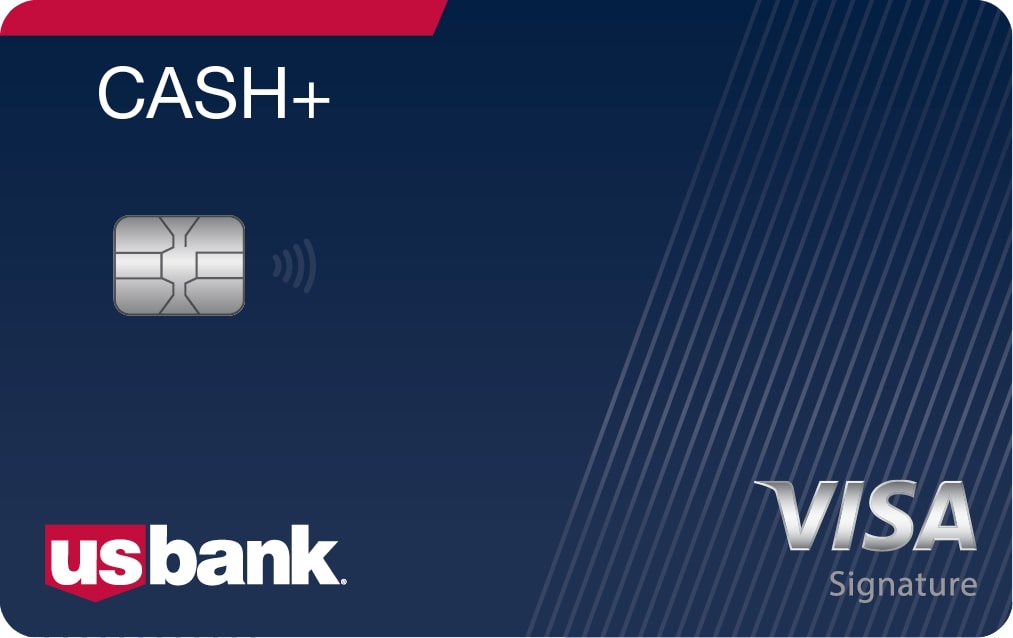
The U.S. Bank Cash+ Visa Signature is one of the best credit cards for startups known as a versatile financial tool offering personalized rewards. Cardholders can earn cash back on categories they choose, including everyday essentials like groceries and gas.
With a welcome bonus and no annual fee, this card provides flexibility and value. The Cash+ Categories feature empowers users to select two categories each quarter, ensuring rewards align with individual spending habits.
The card also includes a robust benefits package, featuring auto rental collision damage waiver and complimentary access to Visa Signature Concierge services. With a competitive APR, this credit card caters to both rewards enthusiasts and those seeking practical benefits, making it a compelling choice for various financial needs.
Annual fees: No annual fees
Rewards and benefits: Welcome bonus, 5% cash back on prepaid travel, flexible redemption
Introductory APR: 0% intro APR, variable APR: 19.49% – 29.74%
Pros:
- No annual Fee
- Welcome Bonus
- Low APR
- Up to 5% cash back in eligible categories
Cons:
- Foreign Transaction Fee
Best for No-Annual-Fee Reward Earning – CapitalOne
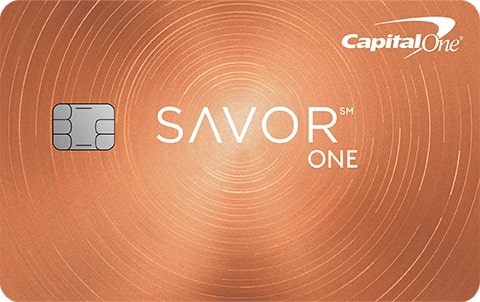
CapitalOne is a business/startup credit card with outstanding features such as no annual fees, no transaction fees, a rewards program, and bonus cash-back opportunities. Your cash back won’t expire for a lifetime and there’s no limitation on how much you can earn. The same is true about your rewards.
The penalty fees for late payment is up to $40. As for the interest rate, your due date is a minimum of 25 days after the end of each billing cycle. And if you’ve paid all your previous balance by the due date, you’ll not pay interest on your new purchases.
Cardholders can earn substantial rewards, including 8% cash back on entertainment, 5% on travel-related expenses, 3% on dining and grocery purchases, and 1% on other transactions. The card also offers a $200 bonus if you spend at least $500 within 3 months of your rewards membership enrollment date and a promotional 10% cash back on eligible Uber purchases.
Annual fees: No annual fees
Rewards and benefits: 8% cash back on entertainment, 5% on travel-related expenses, 3% on dining and grocery purchases, and 1% on other transactions, $200 bonus
Introductory APR: 0% intro APR, variable APR: 19.99% – 29.99%
Pros:
- High Cash Back
- Rewards Program
- Bonus Opportunities
Cons:
- Limited Redemption Options
Best for Travel Perks – Chase Sapphire Preferred Card

Sapphire Preferred is well-known among credit cards for startup businesses. Traveler startupers would especially love it as you can receive 60,000 bonus points by spending $4,000 on purchases within the initial 3 months from the opening of your account. This equates to $750 in travel value when redeemed through Chase Ultimate Rewards.
Earn up to $50 in statement credits annually for hotel stays purchased through Chase Ultimate Rewards. Additionally, receive 5x total points on travel from Chase Ultimate Rewards, excluding hotel purchases eligible for the $50 Annual Ultimate Rewards Hotel Credit.
For other travel expenses, earn 2x points, and earn 3x points on dining, including eligible delivery services, takeout, and dining out. Online grocery purchases (excluding Target, Walmart, and wholesale clubs) also fetch 3x points, along with 3x points on select streaming services. All other purchases accumulate 1 point per dollar spent.
Enhance the value of your points by 25% when redeemed for travel through Chase Ultimate Rewards, with 60,000 points translating to $750 in travel value. Additionally, enjoy a yearly bonus equal to 10% of the previous year’s total purchases on each account anniversary, rewarding you with 2,500 bonus points for a $25,000 spending total.
Annual fees: $95
Rewards and benefits: 60000 bonus points after spending $4000 in the first 3 months, $200 in additional partnership benefit value, 25% additional value with ultimate rewards, 1:1 point transfer, no foreign transaction fees
Introductory APR: 0% intro APR, variable APR: 21.49% – 28.49%
Pros:
- Anniversary Rewards
- Yearly Bonuses
- Travel and shopping protections
Cons:
- High Annual Fee
- No Intro APR
Best for Membership Rewards – Delta SkyMiles Reserve American Express Card

Like many best business credit cards for startups, Delta SkyMiles offers a program of bonuses and rewards right after your registration. You can earn 3X miles on Delta purchases made directly with Delta and 1X miles on other purchases.
With a $550 annual fee, new cardholders can earn 60,000 bonus miles after spending $5,000 in the first 6 months. Notable perks include the first checked bag free, complimentary Delta Sky Club access, 20% back on in-flight purchases, and priority boarding.
Cardholders can enjoy a domestic companion certificate, access to The Centurion Lounge, and a variety of travel insurance. The card also facilitates earning and maintaining Medallion Status with features like Status Boost and MQD Waiver.
Beyond travel, it offers shopping and entertainment benefits, including Global Dining Access, ShopRunner membership, and extensive purchase protections. The card comes with no foreign transaction fees and provides a premium concierge service.
Annual fees: $550
Rewards and benefits: 60000 bonus after spending $5000 in the first 6 months, first checked bag free, access to complimentary upgrades, priority boarding, global dining access, purchase protection, year-end summary
Introductory APR: 0% intro APR, variable APR: 20.99% – 29.99%
Pros:
- Beautiful Design
- Reach Perks and Rewards
- Travel, Shopping & Entertainment Benefits
Cons:
- High APR
- Complimentary Sky Club access is only for one person
Best Welcome Bonus – United Quest Card

The United Quest Card is included in a list of best business credit cards for startups which has an offer with 70,000 bonus miles and 500 Premier Qualifying Points (PQP) after spending $4,000 in the first 3 months, culminating in a rewarding pursuit.
Featuring a $250 annual fee, this offer includes benefits like 3x miles on United purchases, 2x miles on various travel and dining, and 1x mile on other purchases. Cardholders enjoy a $125 annual United purchase credit, up to 10,000 miles in award flight credits annually, and travel perks such as free checked bags, Global Entry credit, and priority boarding.
The MileagePlus program offers up to 6,000 Premier Qualifying Points. There are also protection benefits including Auto Rental Collision Damage Waiver and Trip Cancellation/Interruption Insurance. Additional advantages involve the Luxury Hotel & Resort Collection, DoorDash benefits, and exclusive Cardmember events, making it an attractive choice for businessmen.
Annual fees: $250
Rewards and benefits: 70,000 bonus miles and 500 Premier Qualifying Points (PQP) after spending $4,000 in the first 3 months, earning on all your purchases, up to 10,000 miles in award flight credits each year, free first and second checked bags, no transaction fees,
Introductory APR: 0%
Pros:
- Bonus miles and premier qualifying points
- $125 annual United purchase credit
- Exclusive cardmember events
Cons:
- Earnings for general purchases are only 1 mile per dollar
Best for Fair Credit – Upgrade Cash Rewards Visa

Business credit for startups plays a crucial role and businessmen tend to look for the best credit cards for startups in order not to face any unexpected financial issues. But sometimes banks may also be suspicious about their potential clients because of previous financial challenges or being new to credit. Depending on that, banks may give poor credit, fair credit, good credit, very good credit, and excellent credit. The most common credits are fair and good credits.
Upgrade Card is that kind of start up business credit card, a unique and flexible credit option designed to reshape the traditional credit card experience. With no fees and a fixed-rate APR, the Upgrade Card stands out in the world of credit cards.
Being among the best business credit cards for startups, it offers credit lines up to $20,000, allowing users to consolidate high-interest credit card balances into one lower-rate monthly payment. What sets it apart is its combination of a revolving credit line and installment plan flexibility. Users can choose to pay over fixed terms with equal monthly installments, providing budgetary control and transparency. The Upgrade Card also features real-time alerts, helping users manage their spending and payments efficiently.
Annual fees: No Annual Fees
Rewards and benefits: $200 bonus, unlimited 1.5% cash back
Introductory APR: 0% intro APR, variable APR: 14.99% – 29.99%
Pros:
- Bonuses and Rewards
- Any remaining balance is automatically transformed into an installment loan, featuring a consistent monthly payment.
Cons:
- Low Cash Back
Best for Flexible Payment Terms – Citi Double Cash Card

Before getting a business credit card, startups usually look for features such as “Buy now, pay later”. Citi Double Cash Card upgrades your credit experience by offering you that option. It allows cardholders to customize their payment due date. This flexibility empowers users to align their payment schedule with their individual financial circumstances and budgeting preferences.
By choosing a due date that suits their cash flow, cardholders can optimize their financial management, minimizing the risk of late payments and associated fees.
This card stands out with its unique cash back feature. The cash back is generated from thank you points. You can earn 2 points per your activity: 1 point when you buy and an additional 1 point as you pay for those purchases. After collecting 20000 points, you can redeem it for $200 cash back.
With no restrictive categories, you have the flexibility to maximize your cash back potential across various spending. Like many other business credit cards for startups, this one also offers a valuable balance transfer option, providing an opportunity to consolidate and manage your existing balances.
Beyond rewards, enjoy the benefits of a competitive APR, no annual fee, and access to Citi’s advanced security features.
Annual fees: No Annual Fees
Rewards and benefits: Thank you points, $200 bonus cash back, no caps or categories
Introductory APR: 0% intro APR, variable APR: 19.24% – 29.24%
Pros:
- Double cash back
- No annual fees
- Security
Cons:
- No sign-up bonus
Best for Well-Funded Startups – Marriott Bonvoy Brilliant
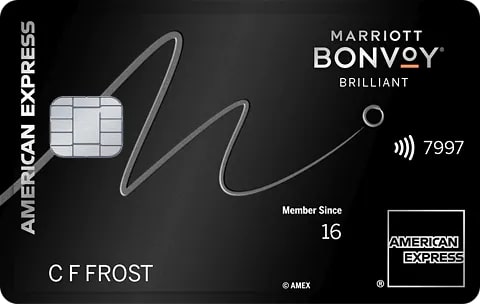
The Marriott Bonvoy Brilliant American Express Card is created as one of the best business credit cards for startups, intended to meet the unique needs of entrepreneurs and business travelers. Having a competitive annual fee of $650, it presents a compelling offer with a generous welcome bonus of 95,000 Marriott Bonvoy Bonus Points after $6,000 in purchases within the initial 6 months.
As part of its startup-friendly features, the card provides 6X points on eligible hotel purchases, 3X points at restaurants worldwide, 3X points on flights booked directly with airlines, and 2X points on other qualifying purchases. Entrepreneurs benefit from a $300 Dining Statement Credit annually, a Free Night Award post-renewal, and coveted Marriott Bonvoy Platinum Elite Status, adding significant value to their business travel experiences.
With perks like a fee credit for Global Entry or TSA PreCheck and 25 Elite Night Credits annually, this card is an excellent choice for startups seeking premium benefits and rewards.
Annual fees: $650
Rewards and benefits: Free Night Award, Marriott Bonvoy Platinum Elite Status, Bonus Points
Introductory APR: 0% intro APR, variable APR: 20.99% – 29.99%
Pros:
- High Welcome Bonus
- Bonus Points
- Fee credit for Global Entry or TSA PreCheck
- 25 Elite Night Credits annually
Cons:
- High Annual Fee
- Low spending limit based on founder’s credit history
Best for Smaller Businesses and Independent Ventures – Wyndham Rewards Earner Business Card
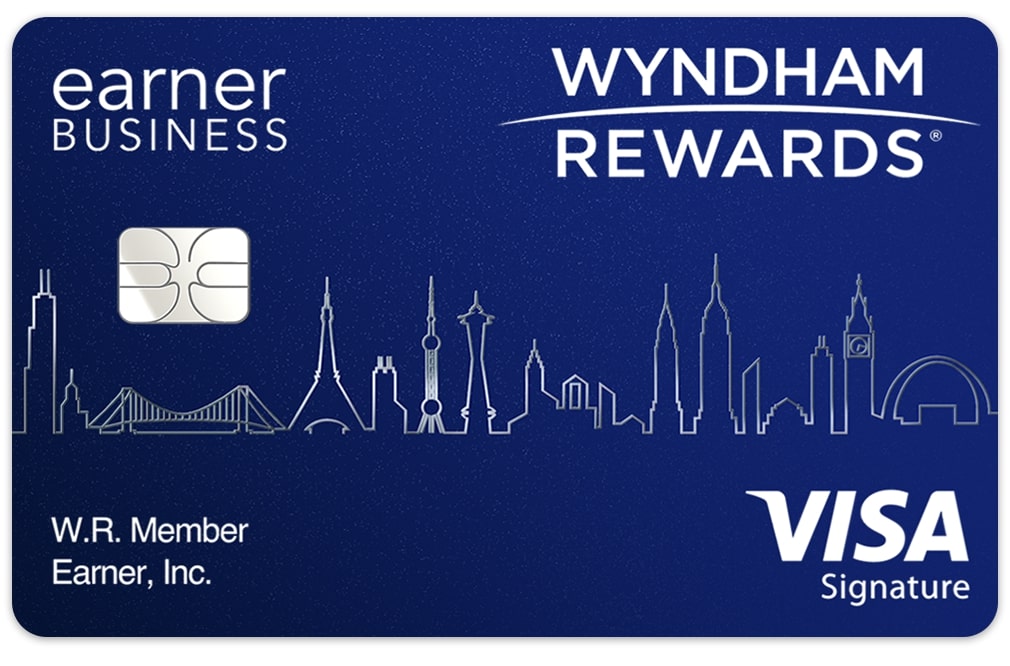
The Wyndham Rewards Earner Business Card stands out as one of the best business credit cards for startups, providing a special and thorough approach to entrepreneurs, startups, and businesses.
With a $95 annual fee, this card offers a robust rewards program, allowing startups to earn 45,000 bonus points after spending $1,000 on purchases in the first 90 days. The best part? You can earn up to 6 free nights with that many bonuses.
Entrepreneurs benefit from 8X points per dollar spent on eligible Wyndham hotel stays, Wyndham Timeshare purchases, and marketing, advertising, and utility expenses. Additionally, the card provides 5X points on eligible gas purchases and 1X points on all other purchases.
With the Wyndham Rewards Earner Business Card, startups gain access to valuable perks, including automatic Wyndham Rewards Gold status, which includes benefits like late checkouts and preferred room upgrades. This card’s business-centric features and rewards program make it an ideal choice for smaller businesses and independent ventures.
Annual fees: $95
Rewards and benefits: 45000 bonus points after spending $1000 in first 3 months, anniversary bonus, cardmember booking discount, unlimited earning of points
Introductory APR: 0% intro APR, variable APR: 20.99% – 29.99%
Pros:
- 8 Points Per Dollar
- Anniversary Discounts
- Valuable Perks
Cons:
- Limited Redemption Options
- Specific Business Categories for Bonus Points
Best for Office Expenses – Triple Cash Back Business Credit Card

The U.S. Bank Business Triple Cash Rewards World Elite Mastercard emerges as the go-to choice for startups, particularly focused on office expenses. Positioned as one of the best business credit cards for startups, its triple cash back rewards at office supply stores provide a tailored advantage for businesses that prioritize office-related expenditures.
With a $0 annual fee, it becomes an ideal financial companion for startups keen on optimizing their budget while enjoying substantial rewards.
The card has 3% cash back on eligible purchases at gas and EV charging stations, office supply stores, cell phone service providers, and restaurants. While the 2% foreign transaction fee may affect businesses with international dealings, the card’s overall benefits, including a variable APR based on creditworthiness and the absence of an annual fee, make it an attractive option for startups aiming to manage costs effectively.
The U.S. Bank Business Triple Cash Rewards card is tailored to businesses with solid credit profiles, presenting an excellent opportunity for startups to build credit and access valuable rewards in key spending categories.
Annual fees: No Annual Fees
Rewards and benefits: 3% or 1% cash back (depending on the purchases), $100 credit
for recurring software subscription expenses
Introductory APR: 0% intro APR, variable APR: 10.74% – 19.74%
Pros:
- Generous Cash Back Rewards
- Mastercard World Elite Benefits
Cons:
- Foreign Transaction Fee
Best for Annual Cash Bonus – Wells Fargo Active Cash Card

Ladies and gentlemen, let us introduce the Wells Fargo Active Cash Card – a powerful contender among the best business credit cards for startups. Start your journey with a $200 cash rewards bonus when you spend $500 in the first 3 months.
Enjoy unlimited 2% cash rewards on all purchases without the hassle of tracking categories or quarterly activations. Plus, there’s a 0% introductory APR for 15 months on purchases and qualifying balance transfers, offering flexibility for managing expenses.
Beyond cash rewards, this card comes with enticing benefits like a $0 annual fee, cellular telephone protection, and advanced security features.
Redeem your cash rewards effortlessly – whether it’s offsetting purchases, applying as a credit to your Wells Fargo account, redeeming for gift cards, or even through PayPal at millions of online stores.
Annual fees: No annual fees
Rewards and benefits: 2% cash rewards on purchases, $200 cash reward if you spend $500 in the first 3 months, redeem for purchases
Introductory APR: 0% intro APR, variable APR: 20.24% – 29.99%,
Pros:
- Welcome Offer
- Cash Back Rewards
- 24/7 Concierge Service
Cons:
- While there’s a 0% introductory APR on balance transfers, be aware that a fee applies to transfers made within the first 120 days
- No Intro APR for Balance Transfers
Best for Frequent Business Travelers – Southwest Rapid Rewards Performance Business Credit Card

Here is the United Business Card, one of the best business credit cards for startups prioritizing business travel. If you want to bring your business journey to a new level with exclusive perks and rewards tailored to frequent flyers, then this is surely a good option for you. This card offers generous sign-up bonuses, including earning up to 80000 points after spending $5000 on purchases within 3 months.
Gain access to United Club and airport lounges, enhancing your travel experience. With every purchase, accumulate miles that can be redeemed for flights, hotel stays, and more. The card also provides priority boarding and free checked bags, optimizing your travel efficiency.
Also, it opens a world of limitless points through its rewards program. Earn an impressive 9,000 points annually on your Cardmember anniversary. Experience exceptional rewards as you earn 4 points for each dollar spent on Southwest Airlines purchases.
Amplify your points with 3 points for every dollar spent with Rapid Rewards hotel and car rental partners. Multiply your rewards with 2 points for each dollar spent on social media and search engine advertising, internet, cable, and phone services. Earn 2 points per dollar spent on local transit and commuting. For all other purchases, 1 point per spent dollar is waiting for you.
Annual fees: $199
Rewards and benefits: Sign-up bonus up to 80000 points, earning points, annual points, Four Upgraded Boardings per year, no foreign transaction fees
Introductory APR: No intro APR, variable APR: 21.49% – 28.49%
Specifications:
Pros:
- Annual Points
- Earning Potential
- Inflight WiFi Credits
Cons:
- High Annual Fee
- Limited Airline Transfer Partners
Best for LLC – Blue Business Cash Card
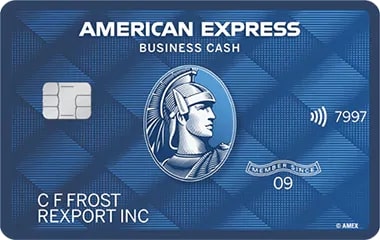
The Blue Business Cash Card from American Express is a top choice among the best business credit cards for new LLC and startups. Tailored for business owners, especially those with newly formed LLCs, this card offers unparalleled advantages.
With a focus on financial flexibility and seamless expense management, it empowers startups to navigate their journey effectively. As one of the best business credit cards for LLC, it provides a hassle-free solution for everyday business expenses.
With a $0 annual fee, it offers a swift decision in 30 seconds. Earn a $250 statement credit after spending $3,000 in the first 3 months. Enjoy cashback rewards with 2% on eligible business purchases up to $50,000 per year and 1% thereafter.
This business credit card for LLC stands out as a reliable companion, ensuring that your new venture thrives with a robust financial tool. Explore the possibilities of business success with the Blue Business Cash Card from American Express.
Annual fees: No Annual Fees
Rewards and benefits: Cash Back, Car Rental Loss and Damage Insurance, employee cards
Introductory APR: 0% intro APR, variable APR: 18.4% – 26.49%
Pros:
- No Annual Fee
- Business-oriented benefits
Cons:
- High Foreign Transaction Fees
Alternatives to Business Credit Cards
There are several alternatives to traditional business credit cards that cater to various financial needs and preferences:
- Business Lines of Credit
Business lines of credit provide a revolving credit limit, giving businesses the flexibility to access funds as needed. The ability to repay and reuse makes it a versatile alternative to credit cards.
- Invoice Financing
Invoice financing allows businesses to convert outstanding invoices into immediate cash. This is particularly beneficial for companies with irregular payment cycles, helping them maintain consistent cash flow.
- Equipment Financing
Tailored for businesses requiring equipment, this financing option enables companies to acquire necessary assets without a significant upfront investment. Structured repayment plans align with the equipment’s lifespan.
- Government Grants and Programs
Government grants and programs offer businesses financial support without incurring debt. These opportunities often target specific industries or projects, providing a valuable injection of capital without repayment obligations.
FAQ
How does a business credit card differ from a personal credit card?
A business credit card is specifically designed for business-related expenses, offering features like expense tracking, employee cards, and business rewards. It helps separate personal and business finances, making bookkeeping easier. Personal credit cards are intended for individual use and may not provide the same business-centric features.
What are the eligibility criteria for startups to apply for a business credit card?
Eligibility criteria for startup business credit cards vary, but generally, startups need a legal business structure, a good personal credit score, and a solid business plan. Some issuers may require a certain time in operation or minimum revenue. Startups should also be prepared to provide business documentation and demonstrate their ability to repay.
Are there business credit cards tailored for early-stage startups or those with limited financial history?
Yes, some business credit cards are designed for early-stage startups with limited financial history. These cards often consider the founder’s personal credit score and may not require a lengthy business history. Examples include secured business credit cards or those specifically marketed as startup-friendly options.
Can a startup owner with a limited personal credit history still qualify for a business credit card?
Yes, a startup owner with a limited personal credit history may still qualify for a business credit card. Some issuers may consider the business’s potential and the owner’s personal financial situation. However, approval and credit limits may be influenced by the owner’s creditworthiness, making it advisable to explore options tailored for individuals with limited credit history.
What should startups consider when issuing employee cards on their business credit account?
When issuing employee cards on a business credit account, startups should consider setting spending limits to control expenses and regularly monitor transactions for any irregularities. Providing clear guidelines on card usage and expense reporting helps maintain transparency. Additionally, choosing a business credit card that offers features like real-time expense tracking and customizable card controls can enhance control and streamline management.
What are the potential risks and pitfalls for startups when using business credit cards?
Potential risks and pitfalls for startups using business credit cards include accumulating high-interest debt, damaging the founder’s personal credit if the business defaults, and overspending without a clear repayment plan. Relying heavily on credit cards for funding can lead to financial instability. It’s crucial for startups to manage credit responsibly, stay within budget, and be aware of the terms and fees associated with their business credit cards.
Conclusion
To sum up, our exploration of the best business credit cards for startups underscores their role in promoting financial health and operational efficiency.
When choosing a business credit card for startups, it’s important to analyze the annual fees, introductory APRs, rewarding programs, benefits, perks, and the pros and cons to prevent you from uninformed decisions. Hopefully, this article highlighted how choosing the right credit card can be a crucial factor in your startup’s financial journey, shaping its path to success.




